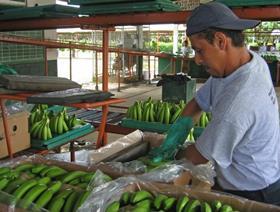
Richard Salazar, executive director of Ecuadorean banana exporter association Acorbanec talks to Fruitnet about the toll the coronavirus outbreak is taking on the country’s banana sector.
Richard, China is becoming an increasingly important market for Ecuadorean bananas. To what extent have exports to China been affected by the coronavirus outbreak so far?
Richard Salazar: The decision to extend the Chinese New Year holiday by 10 days brought ports, banks, customs houses etc. to a complete standstill, causing complete uncertainty until 7 February. There were banana containers stuck in the different ports for more than two to three weeks, and we did not receive payments from the last two weeks of 2019 and the first weeks of 2020.
Due to this fact, no bananas were loaded for shipment to China for almost two weeks. However, as of 10 February, payments were resumed and our customers asked us to send the contracted fruit –in fact they even asked us to send more fruit.
Logistically, what issues have you encountered?
RS: The paralysation of Chinese ports has generated a shortage of containers. Several shipping lines have already imposed a congestion surcharge on containers stuck in the ports of Shanghai, Xingan, Ningbo of US$1,200-US$1,250.
As of March, some shipping companies have announced that they will not serve this market from Ecuador due to the lack of containers. The truth is we’re facing a shortage of capacity.
What other markets have been affected or do you expect to be affected in the coming weeks as the outbreak spreads?
RS: Unfortunately, the coronavirus has spread all over the world and things have got more complicated. The Middle East is our third largest market for bananas. As Turkey has unilaterally closed its borders because of the spike in cases in Iran, this means that the large volume of the bananas that pass through the Turkish port of Mersin en route to Iran, Iraq and Syria can no longer do so. This has caused a backlog of containers in Turkey, with several more ships on the way. We have no idea when the border will reopen.
Are you already seeing a significant decline in orders in other parts of the world?
RS: As I mentioned earlier, orders in China have now resumed. However, the shortage of containers we anticipate a 20 per cent reduction in exports to this market. The situation in the Middle East is uncertain due to the ongoing closure of the Turkish border and increasing incidences of coronavirus in Iran.
We’re also seeing a fall in shipments to Italy after several cities were put under lockdown. But this is down to logistical issues rather than a lack of demand. Italy had already reduced its purchase of Ecuadorean bananas by 48 per cent last year compared to 2018.
What measures has the sector had to take so far to alleviate the situation?
RS: We have held meetings with the Ministers of Foreign Trade and Agriculture to highlight the problem that we’re facing and the implications for Ecuadorean exports. In particular, we’ve stressed the need to establish timely and agile credit lines for exporters to ease the problem of late payments and ensure that they can pay producers and suppliers. We’ve also asked for the immediate and temporary application of the Simplified Tax Return System
What are the implications for the sector if the outbreak continues to spread?
RS: This is already a worldwide problem. The Chinese shutdown has halted production and export from that country, causing a fall in the price of commodities like oil, which is affecting the economies of countries like Russia and the Middle Eastern nations. Russia is the second biggest market for Ecuadorean bananas, and it has already devalued its currency. In Europe, the euro has also been devalued compared to the dollar, which also affects our exports.
If the virus continues to spread this will further complicate the distribution of bananas and reduce demand.
Have you developed a contingency plan in case the crisis continues and extends?
RS: In the first instance we are working hard to reduce our exportable supply and activating credit lines for producers and exporters in Ecuador, as well as requesting that the government provides the sector with tax relief, as mentioned earlier.



